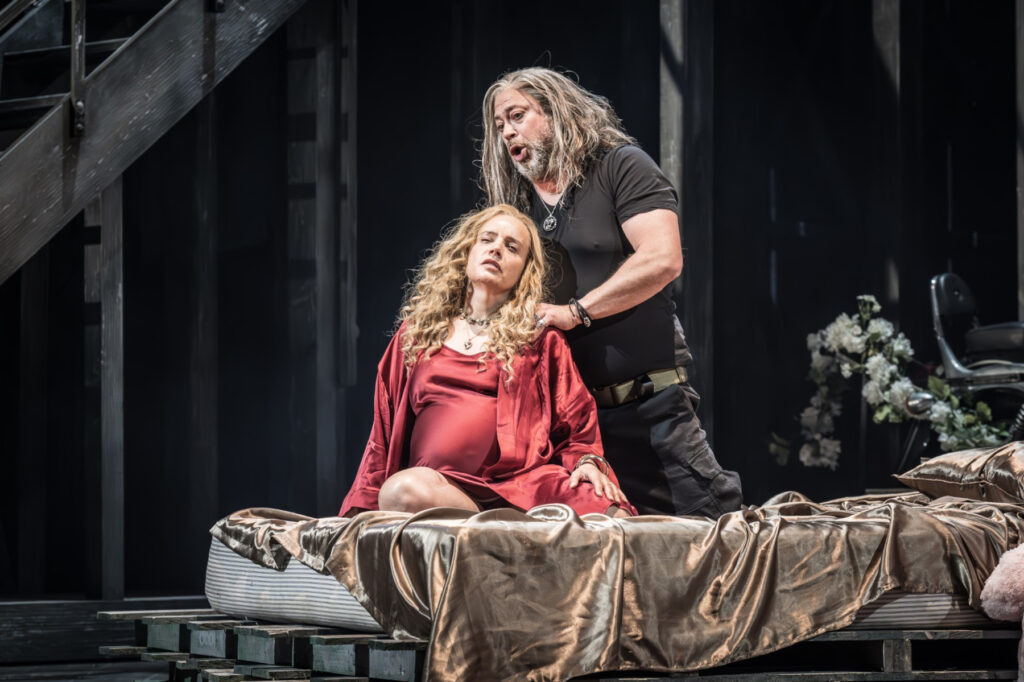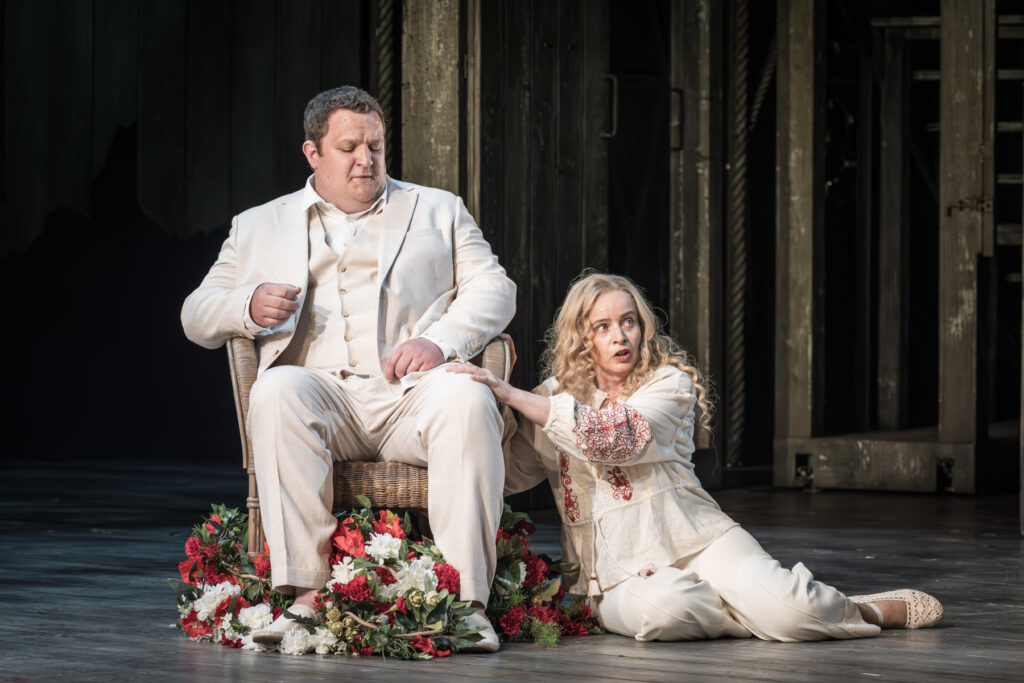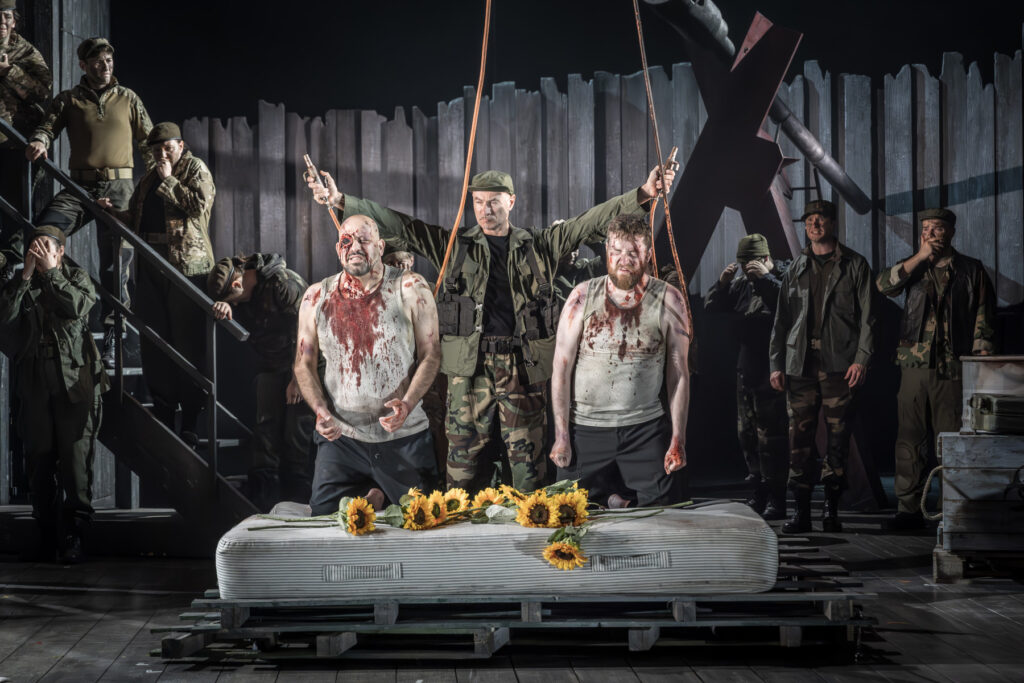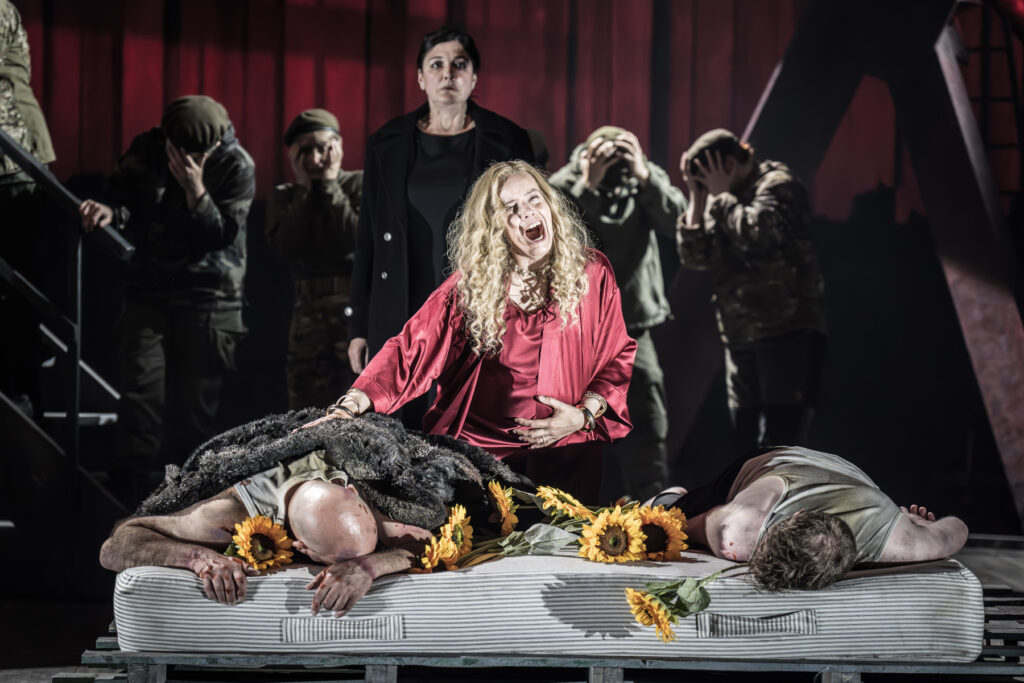Scenes of torture, execution and bleak rows of coffins may not be the cheeriest of hors d’oeuvres before your interval bubbly. This is Grange Park Opera’s new staging of Tchaikovsky’s rarely performed Mazeppa, where love and political ambition collide with fatal consequences. No chainsaw massacre here, as in David Alden’s presentation for English National Opera in 1984, but there’s still much to disturb with its graphic content. Key to the success of Wasfi Kani’s initiative is her terrific cast and production team which includes Rachel Nicholls, renowned director David Pountney and the Orchestra of English National Opera under Mark Shanahan. It’s a winning formula which, by the end of the evening, makes you wonder why Mazeppa has been so neglected. And if over-long episodes bookend the work, that’s a small price to pay for the intense drama in between.

Of course, the work has parallels with today’s events in eastern Europe, suggested by Philip Bullock’s observation in the souvenir programme as “The battle lost by Mazeppa is the battle fought today by Zelensky”. The libretto, drawn from Pushkin’s narrative poem Poltava, focuses more on personal struggles than political ideology and, principally, Mazeppa’s fateful decision to side with the Swedes against Tsar Peter’s troops in 1709, all in the vain hope of securing autonomy for his people. In brief, the Ukrainian Hetman Mazeppa is in love with his much younger goddaughter Mariya, whose father, the landowning Cossack Kochubey, opposes the union, and is appalled by the breach of religious orthodoxy. Forced to choose between father and lover, Mariya leaves her family and abandons the doting Andrei, a besotted childhood friend. Tragedy follows when a revengeful Kochubey betrays Mazeppa’s plans for a liberated Ukraine to the Tsar, who hands him back to the Hetman for torture. His subsequent execution, witnessed by his daughter, leads to Mariya’s mental instability and in the final scenes, after the Cossacks’ defeat at the battle of Poltava, we see her cradling Andrei in the ruins of her childhood home, as he lies dying from wounds inflicted by an unrepentant Mazeppa.

Pountney and designer Francis O’Connor fashion a largely mid-20th century setting with our title character conceived as a Hells Angel biker. His long hair trails behind him in the comic ride across the plains of Ukraine, where chorus members variously carry road signage across the stage with a hotel sign briefly appearing to suggest the lovers pausing to make whoopee. Elsewhere, a pair of timber-framed watchtowers suggest Kochubey’s estate, on which his family and friends later burn images of Mariya in condemnation of her transgression. Mazeppa’s weapon-filled fortification reveals a jet fighter and a howitzer, and his torture apparatus leaves little to the imagination, neither does the electrodes used to execute Kochubey and Iskra. And then there’s a gruesomely imagined battle scene, choreographed by Lynne Hockney, in which gas-masked dancers haunt the stage as they emerge from coffins.

Impactful visually, with thanks also to Tim Mitchell’s lighting, this production benefits enormously from its cast of singer-actors led by a sonorous David Stout as Mazeppa. He inhabits the role with flair, fully convincing as the inspirational figure to whom Mariya is drawn, as if by some mysterious power. His Act 2 ‘hymn’ to his heavily pregnant bride superbly fuses passion and regret as he turns away from her to ignore questions about his love for her. This Mazeppa is a self-interested, coke-snorting schemer who destroys the one he supposedly loves. Rachel Nicolls impresses as Mariya, her voice soaring over the orchestra in her opening declaration, her hopes turning to dust with the news of her father’s impending death. Her descent into madness is finely achieved and her closing lullaby an emotional highlight.
Croatian-born bass Luciano Batinić is a resolute and misguided Kochubey who brings gravitas to the dungeon scene, his great soliloquy under torture when manacled to a wall, is especially harrowing. Sara Fulgoni, as his wife Lyubov, makes the most of her moments as Mariya’s mother, especially affecting when urging her daughter to intervene to save her father’s life. John Findon makes a fine job as a vengeful and wistful Andrei, his childhood reflections as poignant as Andreas Jankowitsch’s brutal Orlik is disturbing.

In the pit, Mark Shanahan draws out the dark colouring of Tchaikovsky’s imaginatively scored work, finding plenty of space for its grandeur and intimacy from the Orchestra of English National Opera. When the composer completed his sketches for Mazeppa he wrote to his publisher: “I think that the public, and the singers, and I, and Jurgenson will be satisfied”. Judging by the response from those around me on the opening night, the audience was well and truly satisfied.
David Truslove
Mazeppa
Music: Pyotyr Ilyich Tchaikovsky
Libretto: Victor Burenin, based on Pushkin’s poem Poltava
Cast and Production Staff:
Mazeppa – David Stout; Kochubey – Luciano Batinić; Lyubov – Sara Fulgoni; Mariya –Rachel Nicholls; Andrei – John Findon; Orlik – Andreas Jankowitsch; Iskra – Sam Utley; Drunken Cossack – Benjie Del Rosario; Dancers: Andrew Ashton, Malachi Briant, Ashton B. Hall, Dominic Lamb
Director – David Pountney; Designer – Francis O’Connor; Lighting – Tim Mitchell; Choreography – Lynne Hockney; Conductor – Mark Shanahan; Orchestra of English National Opera; Grange Park Chorus
Grange Park Opera, West Horsley, Surrey, 14 June 2025
Top image: Mazeppa (David Stout) and Mariya (Rachel Nicholls)
All photos by Marc Brenner